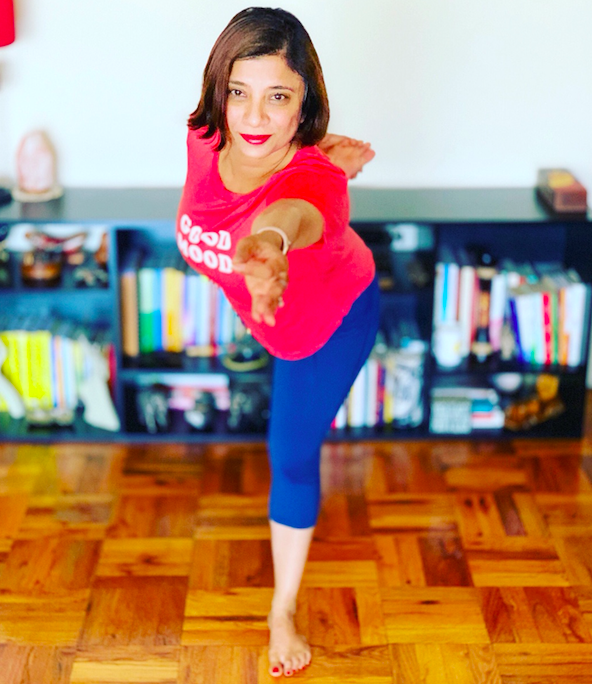
I have always liked movement and speed.
Like a true New Yorker and high Pitta individual (Ayurveda speak), I am a doer who is hungry for more and onto the next thing by the time I meet one deadline. Rest is for the weary, used to be my philosophy for many years.
The first time my father suggested that I learn yoga, I said to him, “But isn’t that something old people do? Twist their bodies in weird shapes?” Granted, I was young, naïve, and ignorant. But the truth is, when I was a little kid, not many youngsters practiced yoga.
My nana, Mom’s father, was the one person I knew who had a diligent daily, yoga practice. But Nana was old, so I assumed I would learn to contort my body when I aged. Also, when you are younger, you are far more impressionable. Unlike Bollywood celebrities and sportspeople spreading the wisdom about yoga these days or a gazillion wisdom pieces on the power of yoga for creativity, we didn’t have that growing up. There were no yoga studios or athletic brands reminding us to be bendy and breathy.
In 2006, I was attending graduate school at Columbia University, running the marketing department of a large accounting firm, managing home, and simultaneously making time for writing and life. I was way over my head. I noticed that my dancing, swimming, cardio, and strength training kept me fit and agile, but my mind felt like a nomad in search of unknown territory. Constantly wired and mentally tired, my sleep started to get impacted. Increasing my daily chai intake didn’t help either. My writing started to feel less fluid.
I panicked. Writing is how I make sense of the world. What would I do if I couldn’t write? Eventually, I pulled a nerve in my neck, due to stress, and it left me bed-ridden for extended periods of time. At one point my doctor suggested that I would need to undergo spinal surgery.
Both my father and husband suggested I give yoga a try. I was reluctant at first—I believed yoga was too slow for the type A New Yorker in me. Pausing and reflecting is what I needed but didn’t know at the time. I had no idea that mindfulness and intentional breathing would light up my creativity.
Connecting the mind, body, and breath helps us to direct our attention inward, and that is a boon to the creative juices. I wish I had known about this secret sooner.
Yoga combines postures, breathing, and meditation. By the end of my first yoga class, I found a bit of stillness. I didn’t quite know how to describe the feeling, but it was like nothing I had experienced before. I didn’t know that when I finished practice, I was on a “yoga high.” We’d raised our levels of endorphins and reduced the amount of cortisol, the stress hormone, in our bodies. Endorphins created a sense of bliss.
Studies have shown that practicing yoga is an extremely effective way of raising endorphin levels. My mind, in those 60 minutes, had stopped multitasking, planning for the upcoming week, or generating a grocery list. It stayed in the present moment. Deep breathing felt rejuvenating. I had felt stuck in my writing—both my thesis and creative writing—but this yoga class led to a humongous release.
Yoga really does have the power to transform your writing.
Ideas started flowing freely almost from the moment I started my practice. Over a period of time, with a consistent yoga practice, I felt a shift in my attitude toward creativity. I noticed that the ups and downs of the writing process didn’t plague me. The way I started to accept that my body would feel different on any given day, I started to accept rejections and selections as a real part of writing life, not a mourning or celebration of my creative abilities. I started to show up daily to my craft and the yoga mat with no expectations and 100 percent dedication. Words started to flow through the creative faucet. On a physical level, I didn’t have to undergo surgery; yoga made my neck stronger and released the stress. I can now do push-ups and Downward Dog with my 50-pound niece sitting on my back.
When I asked Kerry Bajaj, author of Sleep, Baby, Sleep (HarperCollins, India) how yoga impacts her creative life, she said, “As a writer, my body can be affected by too much sitting, and posture is affected by hours hunched over at the laptop. Yoga is a lovely counter-balance!”
What is the connection between yoga, writers, writing, and mental health?
Creativity and its link with mental health have always been much speculated about. In the largest study on this question, researchers found writers to have more than double the risk of schizophrenia and bipolar disorder compared to a control group of accountants. Writers also faced a greater risk of depression, anxiety disorders, and substance abuse.
Research shows that yoga not only has the power to keep our bodies strong and supple, but also has positive effects on the brain. Yoga can help boost moods even more than walking. Physical balance in asanas follows mental balance and that follows inner calm and resolution, which is again amazing for a writer’s mind.
“During lockdown, I’ve been doing a lot of restorative yoga and sun salutations. I practice outside, usually in the late afternoon. It’s a good way to connect with nature, move my body, release stress, and stay flexible. One of the hardest parts of coping with the ‘new normal’ is coping with ambiguity. I find that my yoga practice is a helpful reminder to embrace anitya, impermanence. That teaching was always there, and it was always grounding—but never so important as it is now!” Kerry added further.
When I asked Jennifer Kleeper, USA Today bestselling author of Unbroken Threads about her relationships with yoga, she said, “My mind is in the business of chasing—information, understanding, responsibilities, obligations. This can help my writing, as when bits and ideas I’ve gathered flutter together in just the right way. But distraction is a constant, and sometimes it’s hard to reset. I’m fairly new to yoga, but I’ve found attending class to be one of the few moments my mind clears. It’s one of the few moments when I’m not pulled to ‘look that up,’ or ‘jot that down.’ During our pandemic lockdown, I was fortunate that my favorite yogi-led classes were live online. Taking her class, hearing her say my name, gave me a sense of normalcy and that opportunity to get my head out of the business of chasing and back into the business of the moment.”
A number of studies have shown that practicing yoga has a powerful effect on our hormones. Yoga can boost dopamine levels, a hormone and neurotransmitter, and as a result, impact our writing.
“Yoga has been my savior for around 15 years. I started practicing it in my mid-20. Whereas then, I felt the physical effects, I’ve really felt the mental benefits during lockdown. My morning routine sets me up for the day with a Zen-like feeling and keeps me sane in a world of chaos. The vinyasa flow I like to practice has helped keep my body from missing the gym too much! I have also been working on the first draft of my novel and have written in that how yoga has helped the character with anxiety, something that I didn’t think about before lockdown,” says Priya Mulji, Senior Columnist, Eastern Eye (Britain’s number one newspaper for Asian news).
It’s been over 15 years where I have tried to make yoga (asana, pranayama, and meditation) a part of my daily practice. And I can write a book (actually, I am working on one) on how it has changed my life for the best.
In nine years, 12 of my books have been published traditionally, and I have won several awards. The reason I share this here is not to brag, but to share with you that I owe a lot of my success and emotional stability to yoga practice, both on and off the mat. Yes, I bend so I don’t break. But yoga also makes me a compassionate and prolific writer.
Will you give it a try?
~
“Yoga does not just change the way we see things, it transforms the person who sees.” ~ B.K.S Iyengar
~










Read 8 comments and reply